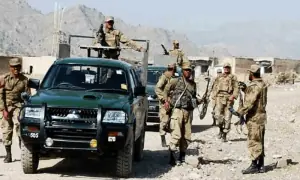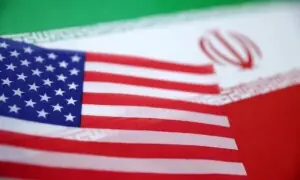US military officers seek conscientious objector status over Gaza conflict
4 min readSome of the US military officers are seeking conscientious objector status over the Gaza conflict, which beyond a year has killed at least 43,259 Palestinians including children and women.
The Hamas attacks in Israel last year and the subsequent Israeli military response have profoundly challenged the beliefs of many US Army personnel, The Guardian reported.
Joy Metzler, a second lieutenant in the US Air Force, is one of them. She has joined a small group of military personnel seeking to leave service due to moral opposition to US support for Israel.
“I didn’t know Palestine was a place before October 7th,” Metzler said, “Suddenly, it felt like a light clicked on for me.”
As the conflict in Gaza extends into its second year, some disillusioned members of the US military are invoking the Vietnam War-era conscientious objector policy to terminate their service based on religious or moral grounds.
Expression of dissent within the military is rare. Earlier this year, Harrison Mann, an army officer with the Defense Intelligence Agency, resigned in protest against US support for Israel. In a more extreme act, 25-year-old airman Aaron Bushnell tragically took his own life by setting himself on fire outside the Israeli embassy in Washington in February.
According to an Air Force spokesperson, since 2021, the service has received 42 applications for conscientious objector status, granting 36 of them. They noted that applications received since October 7 are consistent with pre-conflict averages.
Despite the relatively low numbers, the ongoing conflict in Gaza has significantly influenced service members considering conscientious objector status, according to Bill Galvin, a Vietnam-era objector and director of counseling at the Center on Conscience and War.
Galvin added that his organisation assists approximately 50 to 70 applicants annually from various military branches, noting a surge in interest this year.
Unlike Metzler, it was the self-immolation of airman Aaron Bushnell that prompted her to delve into the history of the conflict and the United States’ involvement in it. “Many of the things I had been told about the US’s role in the world were incorrect,” she admitted.
The war compelled Metzler to reassess her experience at the Air Force Academy. She recalled laughing with classmates while watching footage of civilians fleeing from a drone, uncertain of the country depicted. This memory now filled her with shame. “I graduated from the academy glorifying the act of warfare,” she reflected. “Being a member of the military requires a certain disregard for human life.”
The Department of Defense established the conscientious objector application process in 1962, leading to tens of thousands of approvals over the following decade, particularly during the Vietnam War and the accompanying antiwar movement. But interest has significantly declined since then, with many military personnel unaware that this option exists.
“It’s not common knowledge,” Joy Metzler said, “you don’t want to let your subordinates know that there’s a legal way to break your contract if you begin to have doubts about your service.”
For those who choose to pursue this path, the process is both rigorous and lengthy. Metzler’s application spanned 19 pages, and she is still awaiting a decision after submitting it in July.
Applicants must convincingly demonstrate their opposition to all wars and explain how their views on military service evolved after enlistment. They are required to undergo interviews with both a chaplain and a mental health professional, after which an investigating officer reviews their case and makes a recommendation to a committee that ultimately decides whether to grant conscientious objector status. Historically, the military has approved about half of the applications received.
Larry Hebert, a senior airman in the US Air Force, described the conscientious objector application process as “excruciatingly long.”
Also, read this
British journalist Myriam Francois schools Yalda Hakim on live show
Doctor who volunteered in Gaza says people have nowhere to go
Protesters call for Gaza ceasefire, interrupt Biden campaign speech
Juan Bettancourt, a US airman who filed for conscientious objector status earlier this year, said that many service members are hesitant to voice their concerns but are privately outraged by US support for Israel.
Due to the rarity of dissenting voices within the military, Bettancourt noted that the military often tries to “brush them under the rug.” He pointed out that the Air Force characterised the self-immolation of airman Aaron Bushnell solely as a mental health issue.
In response to growing concerns over US policy towards Israel, a coalition of military personnel and veterans has initiated an “appeal to redress” campaign, reminiscent of efforts made during the Iraq War.
For the latest news, follow us on Twitter @Aaj_Urdu. We are also on Facebook, Instagram and YouTube.



























Comments are closed on this story.